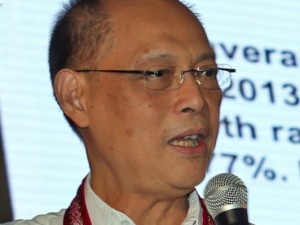MANILA — The Duterte administration has been looking at integrating the military’s pension system with the state-run Government Service Insurance System (GSIS) to arrest the ballooning cost of benefits being granted to retired uniformed personnel, Budget Secretary Benjamin E. Diokno said on Wednesday.
At a forum during the general membership meeting of the Financial Executives Institute of the Philippines (Finex), Diokno said he and President Rodrigo R. Duterte have agreed to discuss the need to reform the military pension system, after the President’s state of the nation address (SONA).
“In six years’ time, the amount of budget for pension will be about 80 percent of the total budget for the military, while only 20 percent will go to salaries of [active personnel],” Diokno said.
“In the past administration, the pension of the military and the police is indexed in the salary of the incumbent. With the increased salary of the military and police, the pensioners got higher pension. In fact, the pension of the military is much higher than the salaries of incumbents. In the police, it’s almost equal,” the Budget chief explained.
For 2017, the government would allocate a hefty amount of about P80 billion for military pensioners, Diokno disclosed.
Last year, the Cabinet-level interagency Development Budget Coordination Committee (DBCC) already flagged the ballooning military pension as a fiscal risk.
“The pension costs of all uniformed services are rapidly increasing every year. The problem is mainly attributable to the features present in all existing retirement laws of the uniformed services—pension entitlement of a retiree is automatically adjusted based on the prevailing scale of base pay for similarly ranked active personnel; pension is non-contributory in nature hence budget comes from the annual general appropriations of the government; and early entitlement to pension benefits even before attaining the compulsory retirement age of fifty-six,” the DBCC said in its Fiscal Risks Statement report for 2015-2016.
“In 2016, the pension budget amounts to P71 billion, which is projected to reach more than double in eight years at P187.9 billion. In view of the foregoing, a reform must be effected for a more sustainable pension system,” the DBCC said.
To address this fiscal risk, the government might have to pass a law repealing the current military pension system, Diokno said.
But those who are currently enjoying the benefits of the indexed pension system would no longer be subjected to change, according to Diokno. “The new pension system will apply to the new recruits,” Diokno said.
Also, Diokno said “we really have to find a way to integrate the military pension system to GSIS.”
“But that also requires some amount of money—we have to infuse money to GSIS,” Diokno added.
The DBCC said an interagency technical working group composed of the GSIS, the Departments of Budget and Management, Finance, National Defense, as well as the Interior and Local Governments had “recommended the creation of a seed fund necessary for the purpose of generating sufficient interest income to fund the annual pension requirements of all uniformed services.”
“According to the latest actuarial study conducted by GSIS, if no reforms are introduced to the existing pension system, the seed fund shall require an amount equivalent to P5.57 trillion. However, if reforms are implemented, specifically the deletion of the automatic indexation feature, the formulation of a mandatory contribution and the designation of a minimum pensionable age—then the amount required for the seed fund is significantly lowered to P2.04 trillion,” the DBCC said. SFM


